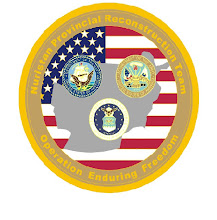Nuristan Provincial Reconstruction Team Public Affairs
NURISTAN PROVINCE, Afghanistan – The Nuristan Provincial Reconstruction Team visited Tupak and Naylar villages Nov. 7, to assess the recent community self-help projects, which included the Nuristan PRT providing fertilizer for villagers and materials for a protection wall for Tupak’s girls school.
The Nuristan PRT has created an opportunity for communities to get involved with small-scale projects. Community self-help projects are projects costing under $5,000, where the PRT will provide either the materials, funds, or both, as long as the community provides the labor. The labor for the projects is on a volunteer basis.
“I believe that these projects benefit the Nuristanis because it gives the community pride in what they do,” U.S. Navy Cmdr. Rodney Ottinger, executive officer for Nuristan PRT, from Knoxville, Tenn., said “If you have to build something yourself, you are more likely to take care of it. The same concept applies for the community self-help projects, if they build a protection wall or retaining wall, they are more likely to protect it and fight against Anti-Afghanistan Forces who may try to destroy their work.”
In Naylar, many families who were unable to afford fertilizer this crop season were given fertilizer.After elders applied for the self-help project, the Nuristan PRT provided 124 bags of fertilizers to 100 to 200 families who were in need.
“I believe the community self-help projects will be successful because it teaches the Nuristanis to work together for the good of the community,” Army Pfc. Jason Dixon, a civil affairs Soldier from Payson, Utah, said. “The people will also learn to rely on themselves instead of coalition forces, because when we leave they will have to depend on each other and their government.”
In Tupak, Nuristan PRT servicemembers provided materials for villagers to construct a protection wall around the local girls school, allowing them to study without fear of harassment by male villagers.
In order for communities to be considered for a self-help project they have to follow a list of requirements. Villages must be green, meaning they must support their local government and coalition forces, report improvised explosive devices in their area or any enemy activity to local police, villagers cannot support Taliban or enemy forces and they must push out Anti-Afghanistan Forces from their communities.
NURISTAN PROVINCE, Afghanistan - U.S. Army 1st Lt. Julia Malouin, a civil affairs team leader and native of Manhattan, N.Y., with the Nuristan Provincial Reconstruction Team visits the Tupak and Naylar villages in Afghanistan’s eastern Nuristan province, Nov. 7, to assess the recent community self-help projects, which included Nuristan PRT providing fertilizer for villagers and materials for a protection wall for Tupak’s girls school. Malouin asks local villagers about the progress of the protection wall for the girl’s school. (U.S. Air Force/photo 2nd Lt Natassia Cherne) (RELEASED)
NURISTAN PROVINCE, Afghanistan – Provincial Reconstruction Team Nuristan visited Tupak and Naylar villages in Afghanistan’s eastern Nuristan province, Nov. 7,to assess the recent community self-help projects, which included theNuristan PRT providing fertilizer for villagers and materials for a protection wall for Tupak’s girls school. U.S. Navy Petty Officer 2nd Class Robert Dailey, a corpsman from Rutherford, N.J., , looks at a young boy with an ear infection during the visit to the Tupak and Naylar villages. (U.S. Air Force photo/ 2nd Lt. Natassia Cherne) (RELEASED)




No comments:
Post a Comment